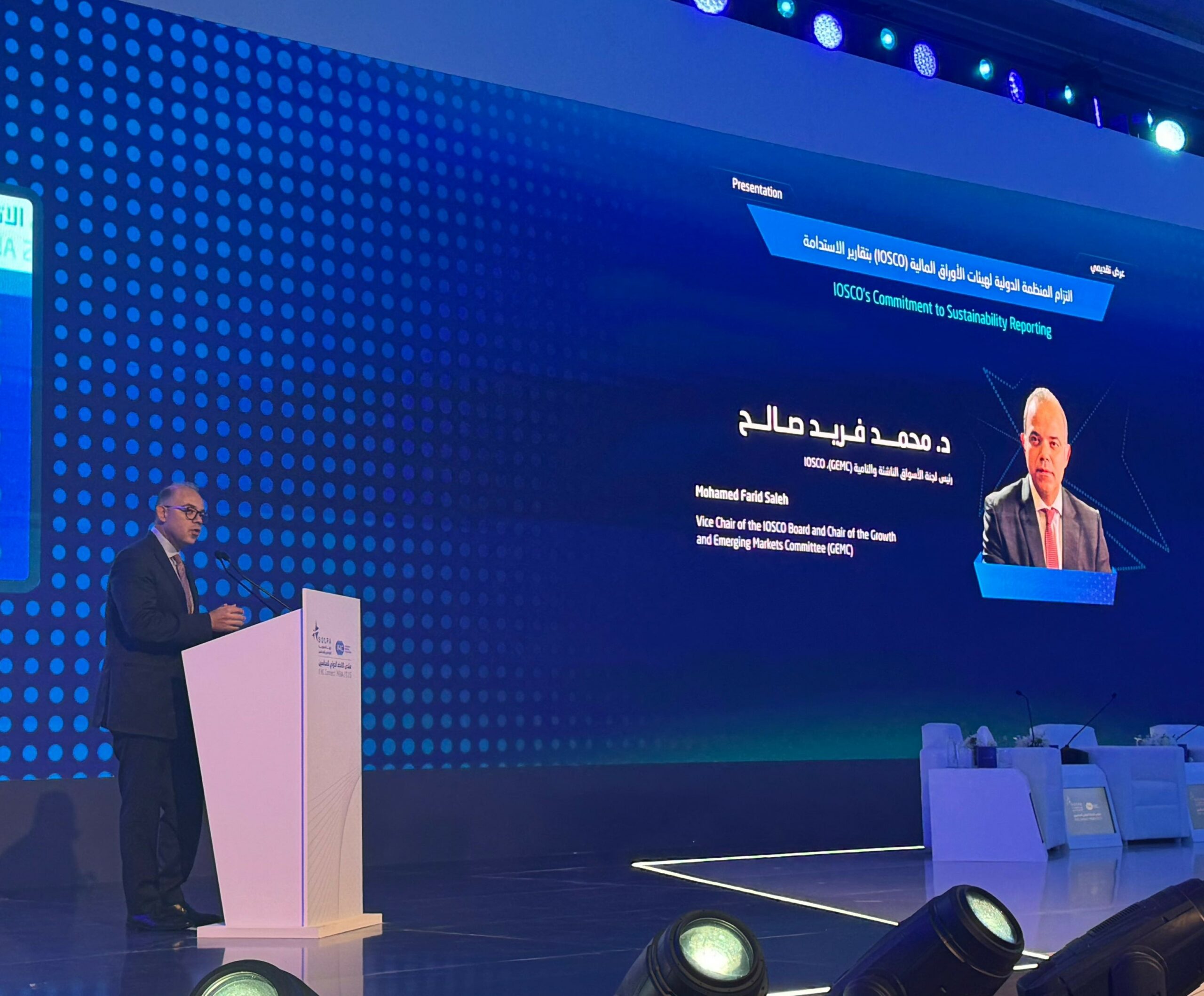- The forum discussed developing clear pathways for professional qualification and leadership to attract and retain talent within regulatory and supervisory bodies.
- FRA Chairman delivered a keynote speech at a roundtable dedicated to the IPSASB’s work program.
Dr. Mohamed Farid, FRA Chairman and Vice Chairman of the IOSCO Board:
- The Authority’s participation in the IFAC Connect forum reflects its commitment to keep pace with global developments in this field.
- FRA aims to cooperate with regional and international institutions to adopt best practices that support the development of non-banking financial markets and enhance their competitiveness.
- Egyptian Accounting Standards are now largely consistent with global trends, a fact that brings us great pride.
- We constantly work to develop all accounting standards and rules as part of the Authority’s goal for integration with all international standards.
- IOSCO’s experience with specific ISSB standards clearly demonstrated the essential need for reliable reporting from governments.
- By providing transparent and reliable disclosures, governments will gain better access to financial tools like green bonds, concessional financing, donor support and blended finance mechanisms.
- Establishing a unified global baseline for sustainability and climate reporting is essential given the urgency of climate change and the need to reflect these risks in financial reports.
Dr. Mohamed Farid, FRA Chairman and Vice Chairman of the IOSCO Board participated in the IFAC Connect MENA 2025 in Riyadh, Saudi Arabia. The forum, organized by the International Federation of Accountants (IFAC) in partnership with the Saudi Organization for Chartered and Professional Accountants (SOCPA) from October 1 to 2, drew wide participation from regional sector leaders and decision-makers.
The forum aims to foster dialogue among regulatory bodies, standard-setters, professional accounting organizations and public and private sector stakeholders. The central goal is to discuss strategies for developing the profession and promoting integrity, transparency and innovation to serve the public interest.
The forum is held under the slogan: ” Driving Transformation and Innovation: Global Priorities, Regional Solutions” aims to shape the future of the profession amid rapid global shifts, such as digital transformation, artificial intelligence and sustainability requirements.
It includes key sessions discussing the future of corporate sustainability reporting, the impact of modern technologies on auditing profession, in addition to themes focusing on ethics, governance and enhancing the profession’s attractiveness to future generations.
The sessions addressed avenues for regional cooperation to accelerate the adoption and implementation of international accounting standards, the exchange of views on updating professional education, supporting more inclusive work environments and developing clear pathways for professional qualification and leadership. These efforts aim to attract and retain talent, particularly women. Participants also discussed the role of technology and artificial intelligence in reshaping the future of the profession and fostering trust and resilience in the markets.
Dr. Farid emphasized that the Authority’s presence at the International Federation of Accountants Forum underscores its commitment to keep pace with global advancements in accounting and auditing. This engagement supports cooperation with regional and international bodies to adopt best practices that develop non-banking financial markets, ultimately enhancing their competitiveness and investment appeal.
At a roundtable on the work program of the International Public Sector Accounting Standards Board (IPSASB) held on the sidelines of the IFAC Connect 2025 forum, Dr. Farid proudly confirmed that Egyptian Accounting Standards are now largely consistent with global practices. He emphasized that continuous, advanced training is essential for confronting current accounting and auditing challenges, reiterating the Authority’s continuous effort to achieve full integration with all international standards.
In the context of global regulation, FRA Chairman and IOSCO Vice Chairman pointed out that IOSCO has endorsed the initial two standards from the International Sustainability Standards Board (ISSB) – IFRS S1 and IFRS S2. He argued that this endorsement highlights the paramount importance of establishing a unified global baseline for sustainability and climate reporting. The experience shows that having consistent, comparable and reliable information is crucial for enhancing investor trust and securing better financing. Dr. Farid recommended that the International Public Sector Accounting Standards Board (IPSASB) use this model to develop a similar public sector baseline, allowing governments to provide reliable reports on their handling of sustainability risks and opportunities.
Dr. Farid disclosed that the International Public Sector Accounting Standards Board (IPSASB) can realize similar reporting benefits for the public sector by concentrating on gradual implementation, alignment with global standards, digitalization and providing incentives. This strategic focus is key to ensure governments are fully equipped to drive sustainable development and boost financial transparency.
He noted that successful implementation requires essential investment in people, systems and training. To facilitate this, he suggested the (IPSASB) strengthen its regional partnerships with bodies like the Financial Services Institute and the Regional Center for Sustainable Finance in Egypt, alongside the Saudi Organization for Chartered and Professional Accountants (SOCPA). These alliances would provide crucial education, technical support and expertise exchange across the region.
The future of sustainability reporting, according to Dr. Farid, is digitalization. He highlighted that IOSCO backed the creation of digital taxonomies for ISSB standards to make corporate disclosures machine-readable and comparable. He affirmed the IPSASB should take a similar step by establishing a framework for digital reporting and tagging of public sector sustainability information. Linking this directly to financial disclosures would make reports significantly more transparent, usable for analysis, decision-making and auditing.
He stressed that sustainability reporting is more than a regulatory duty – it’s a gateway to opportunities. Governments that publish transparent and reliable disclosures are better positioned to access green bonds, concessional financing, donor support and blended finance mechanisms.
Following successful events in Nairobi, Singapore, Bogotá, and Dubai, the IFAC Connect 2025 forum will continue in Mexico City and Jakarta this year. This schedule solidifies the forum’s role as a vital international platform for exchanging expertise and developing practical, public-interest solutions.
Last modified: October 12, 2025
